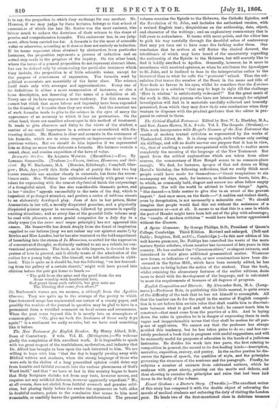The New Testament for English Readers. By Henry Alford, D.D.,
Dean of Canterbury. 2 vols. Vol. II. (Rivingtons.)—We welcome gladly the completion of this excellent work. It is impossible to speak with too great respect of the truthfulness, moderation, and industry that Dr. Alford has brought to bear upon the task intrusted to him. We are willing to hope with him "that the day is happily passing away with Biblical writers and students, when the strong language of those who were safe in the shelter of a long prescribed opinion could deter any from humble and faithful research into the various phenomena of God's Word itself," and that " we have at last in this country began to learn that Holy Scripture shrinks not from any tests, however severe, and requires not any artificial defences, however apparently expedient." He, at all events, does not shrink from faithful research and genuine criti- cism, but placing fairly before the reader the arguments on both sides in doubtful matters, points to the conclusion that seems to him most reasonable, or candidly leaves the question undetermined. The present volume contains the Epistle to the Hebrews, the Catholic Epistles, and the Revelation of St. John, and includes the authorized version, with a revised English text ; disquisitions on the authorship, date, object, and character of the writings ; and an explanatory commentary that is full even to redundance. It teems with moot-points, and the editor has. to pick his way carefully through tho deceitful ashes of controversy that may yet turn out to have 80023 fire lurking under them. One conclusion that he arrives at will flutter the clerical dovecot, the inhabitants of which may have hoard of the uncertainty regarding the authorship of the Epistle to the Hebrews, but will scarcely like to. find it boldly aseribed to Apollos. Generally, however, he is more in accordance with received opinions, as when he attributes the Apocalypse to St. John, and is inclined to lean in tho interpretation rather to the historical than to what he calls the " praeterist " school. Thus the cal- culation that traces the number of the Beast in the name and title of Nero finds no favour in his eyes, whilst he considers that the Lateinos of Irenaetts is a solution " that may be kept in sight till the challenge `Here is wisdom' is satisfactorily redeemed!" Bat the great merit of the work is this, that persons who have not leisure enough for original investigation will find in it materials carefully collected and honestly presented, from which they may draw their own coeclasions when they venters to dispense with the prudent guidance that the editor is pre- pared to extend to them.






























 Previous page
Previous page